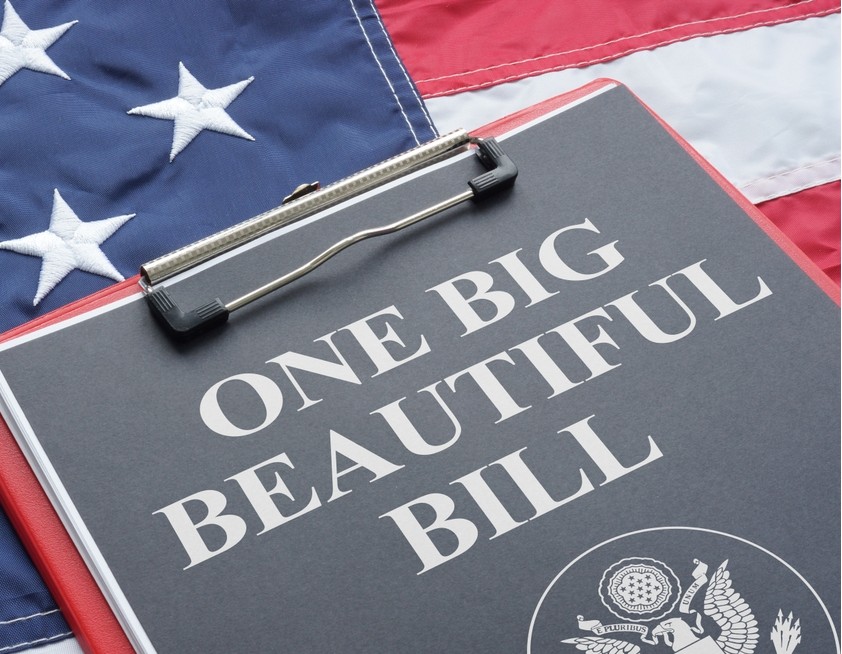Key Tax Provisions for Individual Taxpayers in the One Big Beautiful Bill Act
Significant changes to federal tax law were enacted on July 4, 2025, when President Trump signed the One Big Beautiful Bill Act (OBBBA) into law. This comprehensive reconciliation package includes a wide range of tax provisions impacting individuals, businesses, and international taxpayers.
This post outlines the key 2025 tax changes for individuals and offers early insights into how these updates may influence personal tax planning. As additional IRS guidance becomes available, updates will be provided to help taxpayers stay informed and prepared.
Individual Tax Provisions
Permanent Extension of Lower Tax Rates and Brackets
- The OBBBA makes the individual income tax rates from the 2017 Tax Cuts and Jobs Act (TCJA) permanent. An additional year of inflation adjustment is added to the 12% and 22% bracket thresholds.
Standard Deduction
- The nearly doubled standard deduction is made permanent, effective for the 2025 tax year:
- Single / Married Filing Separately (MFS): $15,750
- Head of Household (HoH): $23,625
- Married Filing Jointly (MFJ): $31,500
- These amounts shown are for 2025, these amounts are indexed for inflation
Child Tax Credit
- Beginning in 2025, the nonrefundable child tax credit increases to $2,200 per child, and the credit amount is indexed for inflation
Estate and Gift Tax Exemption
- Starting in 2026, the exemption increases to $15 million per individual or $30 million for married couples, indexed for inflation.
SALT Deduction Cap
- The State and Local Tax (SALT) deduction cap rises to $40,000 per household, with phaseouts starting at $500,000 MAGI. In 2030, the cap will revert to $10,000.
Charitable Deduction for Non-Itemizers
- Effective in 2026, non-itemizers may claim an above-the-line charitable deduction:
- Single filers: $1,000
- Joint filers: $2,000
No Tax on Tips and Overtime (2025–2028)
- For 2025–2028, above-the-line deductions are created for qualified tips (in certain occupations) and for overtime premium pay, subject to income and occupation limitations. We are anticipating additional detailed reporting to be added to the 2025 Form W-2 to report overtime pay information that will be needed to calculate the deduction, but no changes/guidance has been issued as of the date of this communication.
Enhanced Deduction for Seniors
- From 2025–2028, seniors age 65+ with income under $75,000 (or $150,000 for joint filers) may claim a $6,000 deduction.
Car Loan Interest Deduction
- For tax years 2025–2028, up to $10,000 of interest on loans for U.S.-assembled passenger vehicles may be deductible. Phaseouts and new IRS reporting forms are expected. We expect a new informational tax form (similar to Form 1098-Mortgage) to be created to report qualified auto loan interest, but no changes/guidance has been issued as of the date of this communication.
Moving Expense Deduction
- The deduction is permanently eliminated, except for members of the Armed Forces.
Mortgage Interest and Insurance Premiums
- The $750,000 limit on mortgage insurance premiums is made permanent, along with the exclusion of home-equity debt from qualified residence interest.
Casualty Loss Deduction for Personal Casualties
- This deduction is made permanent and expanded to include state-declared disasters.
Other Deductions and Credits
- Several other provisions are now permanent, including:
- Adoption credit
- Employer-provided childcare credit
- Paid family and medical leave credit
- Education-related benefits
Stay Informed and Plan Ahead
Understanding how these provisions affect individual taxpayers is essential for smart tax planning in 2025 and beyond. Be sure to stay updated as further IRS guidance is released.
At Berndt CPA, we’re here to help you navigate these new provisions and make the most of the available tax benefits. Contact us today to schedule a personalized tax planning consultation.





